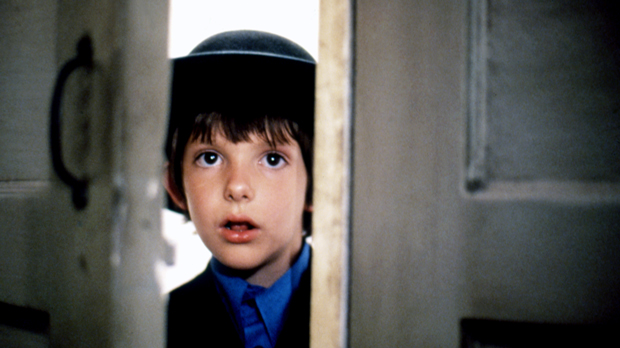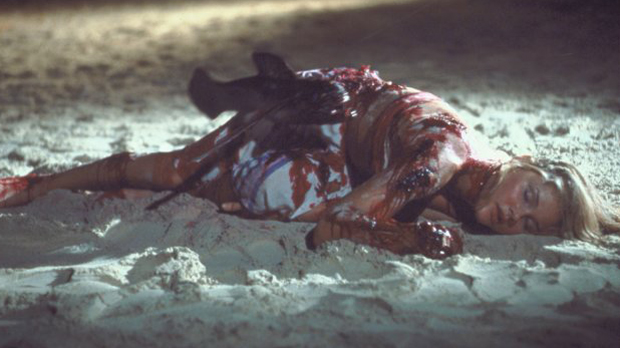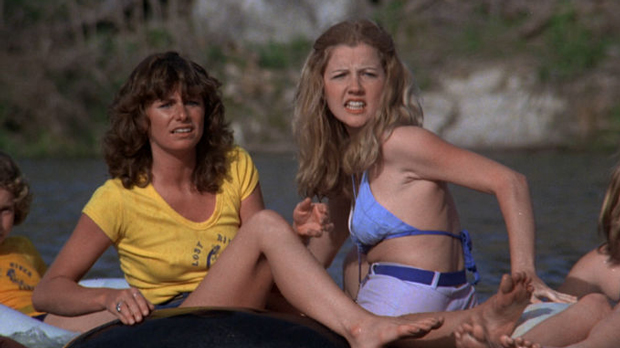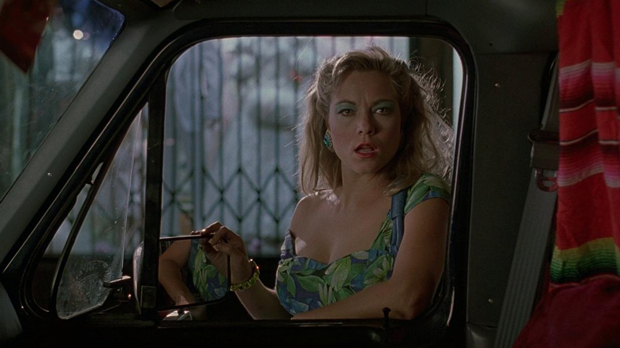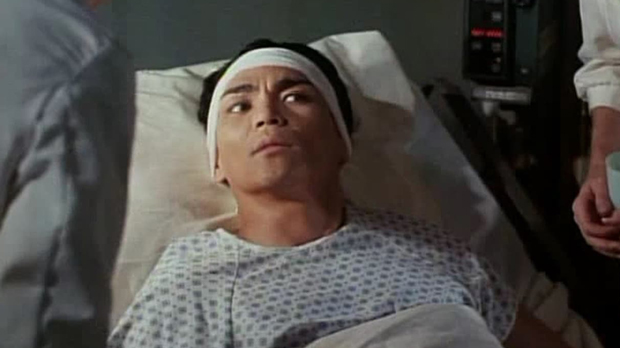 Witness (1985) Paramount/Drama-Thriller RT: 112 minutes Rated R (language, violence, nudity) Director: Peter Weir Screenplay: Earl W. Wallace and William Kelley Music: Maurice Jarre Cinematography: John Seale Release date: February 8, 1985 (US) Cast: Harrison Ford, Kelly McGillis, Lukas Haas, Josef Sommer, James Rubes, Alexander Godunov, Danny Glover, Brent Jennings, Patti LuPone, Angus MacInnes, Frederick Rolf, Viggo Mortensen, Timothy Carhart. Box Office: $68.7M (US)
Witness (1985) Paramount/Drama-Thriller RT: 112 minutes Rated R (language, violence, nudity) Director: Peter Weir Screenplay: Earl W. Wallace and William Kelley Music: Maurice Jarre Cinematography: John Seale Release date: February 8, 1985 (US) Cast: Harrison Ford, Kelly McGillis, Lukas Haas, Josef Sommer, James Rubes, Alexander Godunov, Danny Glover, Brent Jennings, Patti LuPone, Angus MacInnes, Frederick Rolf, Viggo Mortensen, Timothy Carhart. Box Office: $68.7M (US)
Rating: ****
It was a big deal here in my neck of the woods when Witness opened in February 1985. It was filmed in Philadelphia and Lancaster. I saw it opening weekend at a Saturday matinee and the theater (the long-closed Eric Wynnewood) was packed. I’m lucky I got a seat. At the time, I wasn’t too familiar with the City of Brotherly Love, but I had visited Lancaster several times with my family as a child. Still, it was cool seeing places near to me represented on the big screen. Besides, it was a great movie. I ended up seeing it three times at the movies.
Directed by Peter Weir (The Year of Living Dangerously), Witness isn’t just one thing. It’s billed as a cop thriller, but it’s so much more than that. In fact, it’s just an aspect of the film. It’s also a love story between a man and a woman from different worlds. He’s a big city cop; she’s an Amish woman. They never would have met had it not been for the murder that sets the plot in motion. Recently widowed Rachel Lapp (McGillis, Top Gun) and her 8YO son Samuel (Haas, Testament) are taking a train trip to Baltimore to visit family when fate intervenes during a stopover in Philadelphia. While using the restroom, Samuel witnesses the brutal murder of an undercover cop. He narrowly escapes being killed himself. The detective assigned to the case, John Book (Ford, Star Wars), needs the boy to identify the killer. Rachel tries to explain that their laws have nothing to do with her and her son, but Book is intent on bringing the killer to justice. The killer turns out to be a corrupt hero cop (Glover, Lethal Weapon) who was involved in the disappearance of a large amount of a chemical used to make illegal drugs. This, of course, puts the boy’s life in danger.
After an attempt on his life, Book drives Rachel and Samuel back to Lancaster, all the while bleeding out from a gunshot wound. This is where Witness shifts gears. Even though the Amish community generally doesn’t accept outsiders, Book is allowed to stay with Rachel and her father-in-law Eli (Rubes, Dead of Winter) while he recovers. During this time, Book and Rachel become attracted to each other. Most movies would allow this to lead to a torrid sex scene. Weir and the writers Earl W. Wallace and William Kelley handle it differently by having Book acknowledge that they can never be together in one of the sexiest non-sex scenes I’ve ever seen. The reality is that Rachel and her son would be shunned by her people if she gets involved with the outsider. There’s a lot at stake at here.
There’s something else going on in Witness that’s uncommon to crime thrillers. Not only is it an observation of an insular culture, it also shows the contrast between chaotic life in a gritty city and the simple life in the country. The beautiful natural landscapes play as big a role in Witness as the Australian Outback did in Weir’s 1981 drama Gallipoli. Then, of course, there’s the beauty and simplicity of everyday life among the Amish. They are a people who eschew all things modern in favor of their ancestors’ ways. Their homes have no electricity, their clothing has hooks instead of buttons (buttons are considered proud) and they get around by horse and carriage. They also deplore violence; they favor tolerance over “whacking people” (as Rachel puts it). They are a plain people, deeply suspicious of “the English” (as outsiders are commonly referred to). Whether it’s milking a cow or raising a barn, their rural lifestyle is decidedly easier than hunting criminals.
As a cop thriller, Witness is superior. Instead of the usual one-man-army scenario, Weir gives us a believable story with believable characters. It’s a simple case of police corruption and the cop who uncovers it only to be betrayed by somebody he thought was on his side. Ford is terrific as the tough, square-jawed cop with a strong moral code. He manages to sneak in a bit of humor, delivered with his trademark sly smile, with scenes like the one where he quotes a famous commercial to a family that has never owned a TV. Their blank reaction is priceless. He has amazing chemistry with McGillis who gives a great performance as a woman torn between desire and tradition. Young Haas is very good as Samuel, a smart kid facing the dangers of the outside world. Rubes has some good moments as the kind but strict father-in-law who acts as a moral compass to Rachel struggling with temptation.
The climax of Witness is cool as Book goes up against his foes while holding true to his promise to keep the boy safe. There’s also a great scene where Book defends an Amish man from town bullies. What I find remarkable about Witness is its quietude. For long stretches, it’s an observation of a culture of which outsiders rarely get such a good inside look. It’s that rare film that works on every level it attempts. It’s slick, beautiful, insightful and romantic. It is truly masterful filmmaking. This one rates a 10 (out of 10) on the repeat watchability scale.
